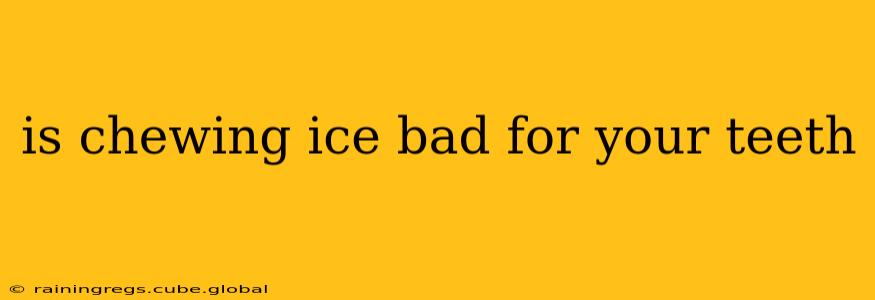Chewing ice may seem harmless, but the seemingly innocuous habit can have detrimental effects on your dental health. While the occasional crunch might not cause significant damage, regularly chewing ice can lead to a variety of problems. This comprehensive guide explores the risks associated with chewing ice and offers advice on how to protect your teeth.
What Happens When You Chew Ice?
The hardness of ice makes it an abrasive substance. When you chew ice, the force and friction can cause significant damage to your tooth enamel, the protective outer layer of your teeth. This damage can lead to:
- Cracked or chipped teeth: The force of biting down on ice can easily fracture or chip your teeth, especially if you have existing cracks or weakened enamel.
- Fractured fillings: If you have dental fillings, chewing ice can dislodge or fracture them, requiring costly repairs.
- Increased sensitivity: As the enamel wears away, the underlying dentin (a softer layer) becomes exposed, making your teeth more sensitive to temperature changes and pressure.
- Worn-down enamel: Over time, consistent ice chewing can lead to significant enamel erosion, leaving your teeth vulnerable to decay and other problems.
Is Chewing Ice Worse Than Other Hard Foods?
While other hard foods like nuts and hard candies can also wear down enamel, ice presents a unique risk due to its extreme hardness and brittleness. The sharp edges of ice crystals can easily cause micro-fractures in the enamel that are not visible immediately but contribute to long-term damage. Furthermore, the act of crunching ice often involves more force than chewing most other foods.
How Can I Stop Chewing Ice?
Breaking a habit like ice chewing can be challenging, but here are some strategies that may help:
- Identify triggers: Understand why you chew ice. Is it boredom, a nervous habit, or a way to cool down? Identifying the trigger can help you develop coping mechanisms.
- Find substitutes: Keep alternative, healthier ways to satisfy your cravings. Try chewing sugar-free gum, eating crunchy vegetables, or drinking cold water.
- Mindfulness: Pay attention to when you're chewing ice and consciously stop yourself. Practice mindfulness techniques to become more aware of your habits.
- Seek professional help: If you find it difficult to break the habit on your own, consider seeking help from a therapist or counselor.
Can Chewing Ice Cause Other Dental Problems?
Beyond the direct damage to teeth, the habit of chewing ice can indirectly contribute to other oral health issues:
- Increased risk of cavities: Damaged enamel is more susceptible to cavities, as bacteria can more easily penetrate the weakened tooth structure.
- Temporomandibular joint (TMJ) disorders: The repetitive strain of chewing ice can contribute to TMJ disorders, causing jaw pain and headaches.
What Should I Do if I've Damaged My Teeth Chewing Ice?
If you suspect you've chipped or cracked a tooth while chewing ice, it's crucial to see a dentist immediately. Prompt treatment can prevent further damage and preserve your tooth.
How Can I Protect My Teeth from Ice Damage?
The best way to protect your teeth is to avoid chewing ice altogether. If you absolutely crave a cold sensation, opt for ice chips instead of large cubes, which are less likely to cause damage.
This article offers general information and should not be considered medical advice. Always consult with a dentist for any concerns about your oral health.
